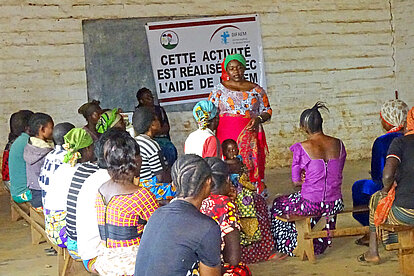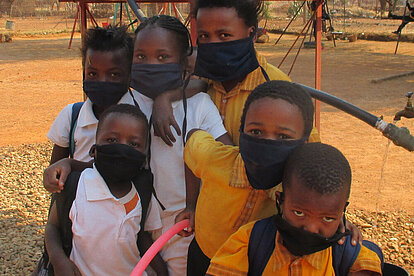Infectious diseases & Covid-19
Prevention and treatment of HIV, Corona and co.

In Southern Africa alone, about 2.9 million people die every year from pneumonia and bronchitis, followed by deaths from diarrhoeal diseases and HIV and AIDS. Yet many African countries have made great progress in the fight against viruses, bacteria and deadly parasites. In particular, deaths from malaria have been significantly reduced.
Many infectious diseases can be contained if the transmission routes are blocked. Simple measures such as hand hygiene, the use of condoms or bed nets often play an important role here. Appropriate protective equipment is also essential for the prevention of highly contagious diseases. But the world of infectious diseases is very dynamic. New pathogens can be transmitted more easily due to the proximity between wild animals and humans and can spread rapidly in a globalised world. This was most recently seen in the Corona pandemic. The introduction and permanent maintenance of hygiene measures is the basis of epidemic preparedness.
DIFÄM is committed to the prevention and treatment of infectious diseases, especially corona, tuberculosis, HIV and AIDS: we equip our partner facilities with protective materials, provide information on the proper treatment of such diseases and educate communities on preventive measures. In addition to these well-known infectious diseases, millions of people suffer from the so-called Neglected Tropical Diseases. DIFÄM promotes primary health care in the villages in order to provide local education and care for uncommon diseases as well.
Neglected Tropical Diseases
Combating poverty-related infectious diseases

In addition to very well-known infectious diseases, 1.5 million people are also affected by so-called neglected tropical diseases. These tropical infectious and poverty-related diseases disable, disfigure, stigmatise and can lead to death - and mostly affect the poorest, who are often forgotten. Compared to other infectious diseases such as Covid-19 or malaria, little money is spent on researching and treating these diseases. Among them are sleeping sickness, river blindness and podoconiosis.
The people affected often live secluded lives in their villages. They are excluded and stigmatised. They are too poor to go to the cities in order to be cared for in medical centres. DIFÄM promotes basic health work in the villages, providing local education and care also in the case of rare diseases.
As there are hardly any incentives for the industry to invest in the control of these diseases, new models and partnerships are needed to advance the research and development of new drugs and vaccines. This is why DIFÄM is involved in the Neglected Tropical Diseases Network to inform the public about the issue and to raise awareness.




